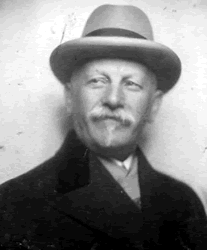Panevezys
Stories
Yatzkan / Jackan Family
I talked with Sonia nee Kushner Lahav in Kibbutz Mizra in 2005. Sonia
told me that she is 81 years old. Her family was well of and
lived in Subacius, Lithuania ( near Vabalninkas). Her mother: Cheina
(nee Yatzkan)
Came from a well known family in the area. Cheina' uncle was Shmuel
Yatzkan the publisher of the Jewish newspaper: The Haynt
Her father; Wolf Kushner ,owned a large store and machines that were
used by the farmers in the area to break wool.
His connection with those Lithuanian farmers saved his life as well as
the life of three of his children and six other people.
Even before Germany attacked Russia, during the Soviet time in
Lithuania ( 1940)- Vulf Kushnir gave a farmer friend he knew by the
name of Malkevitz much of his belongings.
After the Nazis took control of the area the family was first in
Subacius, Lithuania in a
ghetto and later in the Ponovitzes Ghetto. The mother Cheina was killed
already in 1941 and her middle sister Mina was also killed. Her father was
able to escape with her brother, her youngest sister Aschia and her.
They walked for a long time during the nights until they arrived to
the farmer Malkevitz. He hid
them under the hay and after some time they were joined by other Jews
who escaped the ghetto and arrived to the farmers' home as instructed
by her father.
Life was very dangerous. They had to hide from neighbors and in great
fear that they would be discovered.
The Farmer talked to a priest and Sonia ( her her youngest sister
Aschia) were converted to be Christians. She remembers a long ceremony
with bread that ended by the
priest saying that now she will have to take a train ride and say that
she is a Lithuanian farm girl when she gets on the train. To encourage
her before taking the ride she was told that even if she would be
found and killed she will go to haven since she is a Christian.
She wore farmers clothes and held her mouth as if she has great pain
so if she needed to talk her Jewish accent would not be noticed.
She arrived to a monastery in the area of Rokishik were she became
assistant to the nuns.
The place was filled with orphaned little children that were left as
babies at the doorsteps of the monastery ( many must have been Jewish)
She had to take care of the little children and she loved her job. The
nuns were so happy with her that they said she must become a nun.
As the war ended she returned to her Jewish roots. Her brother who is
about 70 years old lives in London (He since passed away) . Her father
went to South Africa with the youngest daughter after the war. All the
people who hid with the farmer survived, despite the fact that a
neighbor informed the Germans. They escaped in
time and hid in another place.
A son of the farmer visited the families in Israel that his father rescued.

"In the years of transition from the 19th to the 20th century, I,
together with my brother and another young man, studied Hebrew with
Shmuel Yakov Yatzkan, who later became the founder and publisher of
the daily Jewish newspaper haynt [“Today”] in Warsaw. Yatzkan played
an important role in the development of the Zionist movement and in
Hebrew culture in Ponevezh. He and my father encouraged a strong
feeling of Zionism in the workers and young people. I believe that he
organized the first Zionist group of children under the name of
pirkhei tzion [“Flowers of Zion”].
Yatzkan was an autodidact and a “self-made man” [English in the
original]. He was born in Vabolnik, a small town not far from
Ponevezh. After his school years, he wandered around to various houses
of study and gegesn teg [eating and sleeping in different homes each
night]. He told us how, late at night, he and the other young men
would roast potatoes over the hot tin covers of the ovens. Except for
Yiddish and loshn koydesh [the “holy tongue,” i.e. Hebrew], he
basically knew no other languages. However, he had a feeling and a
sense for spiritual matters and easily oriented himself to the
problems of social and political life. I believe that his aesthetic
feelings were not highly developed. He had an unhappy relationship
with music. I remember how he plodded for weeks, attempting to learn
my father's nigun [melody] for haneros hal'lu [“We kindle these lights
for Chanukah”] so that he could sing with us when we lit the Chanukah
candles.
He was a talented teacher and developed sound educational principles.
When he was still a youth of 18, he wrote a booklet, Henokh Leyner
[Rav Gershon Henokh Leyner, the Radzyner Rebbe], about improving
Jewish education."